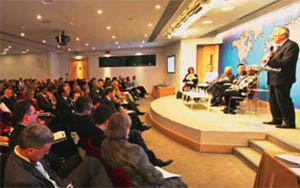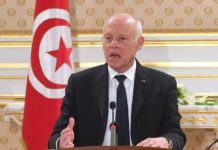
Texte de Chatham House à propos de l’attribution du Prix 2012 à Marzouki et à Ghnnouchi:
Sheikh Rached Ghannouchi and Dr Moncef Marzouki are joint winners for the successful compromises each achieved during Tunisia’s democratic transition. Representing two sides of the same coin, they have together ensured that Tunisia remains at the forefront of the new democratic wave in the Middle East and North Africa.
Sheikh Ghannouchi has been widely praised for his contribution to promoting the idea of compatibility between Islam and democracy and modernity which has been translated into the promotion of a culture of tolerance and bridge-building across the political spectrum. He believes that majority rule on its own is not sufficient during transition periods to achieve success. Instead, consensus and coalitions are needed to tackle the challenges of democratic transition. This belief has led the Ennahdha party to make the choice of forming a coalition government with other secular parties which has led people across the world to view Tunisia as a model in the region where consensus, respect and acceptance of others – Islamist and secularist – has become the rule.
Dr Marzouki, a former president of the Tunisian League for Human Rights and a political prisoner under Ben Ali’s regime, returned to Tunisia from exile in France in January 2011 to legalize and lead the opposition party he founded in 2001, the Congress for the Republic. During the campaign for the Constituent Assembly elections, Dr Marzouki demonstrated his ability to compromise and work across political and ideological divides. Although secular in orientation, his party joined the governing coalition formed by the Ennahdha party in Tunisia’s first popularly elected governing coalition. As the first democratically elected Arab president and a life-long human rights activist known all over the Arab world, Dr Marzouki has provided an example for others in the region to follow.
More InformationThe Chatham House Prize is an annual award presented to the statesperson deemed by members of the Royal Institute of International Affairs at Chatham House to have made the most significant contribution to the improvement of international relations in the previous year.
The other nominees for this year’s prize were Archbishop Deng, South Sudan, Christine Lagarde, Managing Director, International Monetary Fund, and Jonas Gahr Støre, Minister of Foreign Affairs, Norway. More about the nominees.
The 2012 award ceremony will take place in London on Monday 26 November.
More about the Chatham House Prize.




